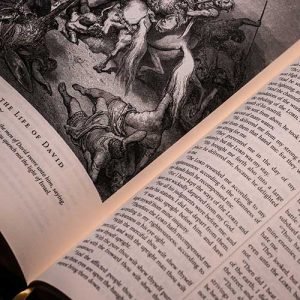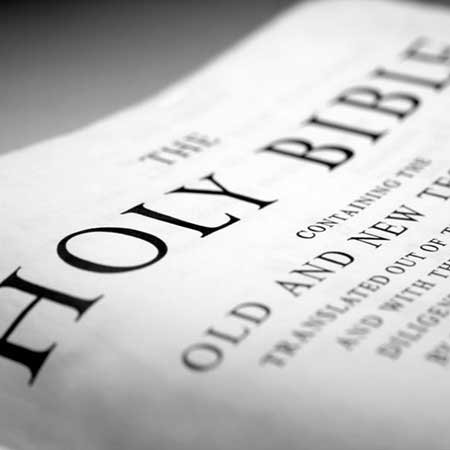The Kingdom of God in the Old Testament – Part 1

 Part 1 – From Adam to King David
Part 1 – From Adam to King David
Although the term “Kingdom of God” does not occur anywhere in the Old Testament the idea of God ruling as King can be seen everywhere. When Jesus began proclaiming the Kingdom of God, he never had to explain it, nor was he ever asked what he meant by it. A detailed concept of the Kingdom of God had developed over four millennia and “The hope of Israel”, the restoration of The Kingdom of God in a time-space world, was deeply etched on the soul of every Jew.
The “kingdom of the Lord” appears in 1 Chronicles 28:5 and 2 Chronicles 13:8, with reference to the Kingdom God gave to David, who passed it on to his son, Solomon, to be a Kingdom forever. Daniel refers to the kingdom and dominion of God Dan 7:14 “His dominion is an everlasting dominion that will not pass away, and his kingdom is one that will never be destroyed.” Dan 7:18 “But the saints of the Most High will receive the kingdom and will possess it forever — yes, for ever and ever.” In these passages we have, at least, a framework to build on: God has a Kingdom. It is an eternal Kingdom involving a ‘dominion’ – an exercise of sovereign government. The saints (the subjects of the Kingdom) will, at some time in the future (in time or eternity) interact with this Kingdom, presumably as its guardian, protector, instrument and dispenser. Not a great deal of clarity or definition here – but these verses do provide some clues for us to begin our research.
GOD IS KING
More common in the Old Testament are references to God as King, His reign, His dominion, etc. He is proclaimed as the ruling King, both of Israel and of all the nations in innumerable verses that are easily found with a concordance. Eg Jer 46:18 “As surely as I live,” declares the King, whose name is the Lord Almighty…”. Psalm 10:16 “The Lord is King for ever and ever,” Ps 29:10 “The Lord sits enthroned over the flood; the Lord is enthroned as King forever,” Ps 145:13 “Your kingdom is an everlasting kingdom, and your dominion endures through all generations,” Lam 5:19 “You, O Lord, reign forever; your throne endures from generation to generation,” Isa 37:16-17 “O Lord Almighty, God of Israel, enthroned between the cherubim, you alone are God over all the kingdoms of the earth. You have made heaven and earth”, Dan 4:34 “Then I praised the Most High; I honored and glorified him who lives forever. His dominion is an eternal dominion; his kingdom endures from generation to generation,” Zeph 3:15 “The Lord, the King of Israel, is with you.”
To the Israelites, other nations had their gods and kings, but their God had been revealed as far superior, the ultimate and highest God, the creator and sustainer of all that existed. Everything was subservient to Him and he possessed ultimate power. He was King over all, but especially over Israel, the apple of his eye Zech 2:8.
THREE KEY PLAYERS
Continuing this study, we cannot overlook three foundational men in the Old Testament, who set the prophetic ball rolling regarding the Kingdom of God. The first was Adam, the second, Abraham and the third was David. Adam was the father of the human race. Abraham was the father of the Israelite nation, father of the faithful, and David was the first God-given King that Israel crowned. Strangely, two of them are referred to as ‘prophets,’ though none of them was a speaking or writing prophet, in the normal sense of the word. Nevertheless, each of their lives became a prophetic beacon for the Israelites to learn from.
Adam
Adam himself was given the opportunity to become God’s vice-regent, with Eve. God’s original intention was to share his rulership through a partnership with our first parents. They were offered dominion over everything in God’s creation Gen 1:26-30. Their life in Eden was perfect. They had unbroken fellowship with God and everything was ‘good.’ Eden was the place on earth where God’s rule, his kingdom, was originally exercised.
But it wasn’t long before the fall ruined their idyllic life in Eden. God barred them from his presence, but remarkably and graciously, he immediately made promises of a future intervention that would restore the Edenic blessing. God prophesied to the serpent in Gen 3:15 saying ‘he will crush your head, and you will strike his heel.’ This is often called the ‘proto-evangelium,’ the first gospel – for that is what it was! Evangelical’s usually see this as the first, if shrouded, prophecy of the Messiah. The ‘seed of the woman,’ an authentic human being, will one day come to earth to destroy Satan, reverse his work and suffer wounds in the process.
How gracious God was to include this promise so early in humanity’s journey. The rule of God would be someday be restored through this God-given Messiah.
Abraham
Gen 12:1-3 The Lord had said to Abram, “Leave your country, your people and your father’s household and go to the land I will show you. I will make you into a great nation and I will bless you; I will make your name great, and you will be a blessing. I will bless those who bless you, and whoever curses you I will curse; and all peoples on earth will be blessed through you.”
So begins the next chapter in the history of redemption. God would use ‘a great nation’ that came from Abraham’s loins, to ‘bless all peoples on earth.’ This nation was to become both the model of God’s ‘blessing’ as well as it’s custodian and distributer.
This promise was repeated several times, Gen 13:14-17, 17:1-8, 17:19-22, 22:15-18. Thereafter, the promise was passed on to Abraham’s son, Isaac Gen 26:1-5, and his son Jacob Gen 27:25-29, 28:1-4, 28:12-15, 35:9-14.
From Abraham to Jacob we see God’s extraordinary grace – wealth, health, influence and promises for God’s new people, Israel, who were chose to have an astonishing impact on the world. At this point future looked promising!
David
In Samuel’s day the Israelite nation began to hanker after the world. They wanted the dignity and honour and perhaps the security, that the other nations had in their monarchies. They demanded to have a king like other nations. You can read the story in 1 Samuel 4:8-9, where it is clear to Samuel – and to God – that their choice was doomed to failure and tragedy
This was a serious event in Israel’s history, which was typical of their relationship with God. They were continually throwing off what they thought were the ‘shackles of tyranny’ that God had laid upon them.
After Joshua led Israel into the Promised Land the nation had spiralled into lawlessness and decline. It wasn’t until David appeared as God’s King that the nation’s fortunes began to positively change again. Indeed, David was able to lead Israel to unprecedented levels of blessing and success as a nation under God.
2 Sam 7:1-16 records an amazing prophecy given by Nathan to David promising him a great name, alongside the world’s greatest men; security for Israel and ‘rest from all your enemies;’ a blessed lineage; enduring love that would never be taken away and ‘Your house and your kingdom will endure forever before me, your throne will be established forever.’ As Christian’s today we can see that this was a ‘type’ of the Kingdom that was to come through Jesus Christ. In Rev 22:16 Jesus says “I am the Root and Offspring of David.” The angel said to the young Mary, “He will be great and will be called the Son of the Most High. The Lord God will give him the throne of his father David, and he will reign over Jacob’s descendants forever; his kingdom will never end.” Luke 1:32-33.
David’s Royal Psalms
Throughout David’s Psalms, which became the national hymnbook, there is much teaching relating to the Kingdom of God – its universal dominion, the King’s intervention in human affairs, his visitation in times of need, the ministry of the Messiah and so on. Ps 45:1 introduces David’s thoughts about the King: “My heart is stirred by a noble theme as I recite my verses for the king; my tongue is the pen of a skilful writer….”
David sings of the coronation of the King in Ps 2:6 “I have installed my king on Zion, my holy mountain.”
He exalts God as the great King over all the earth Ps 47,48.
Some Psalms include God’s kingly acts amongst his people. Ps 145:11-13 “They tell of the glory of your kingdom and speak of your might, so that all people may know of your mighty acts and the glorious splendour of your kingdom. Your kingdom is an everlasting kingdom, and your dominion endures through all generations.” Ps 71:16 “I will come and proclaim your mighty acts, O Sovereign Lord.”
Psalms 93–100 are often referred to as “Enthronement Psalms,” since their central message is a declaration of God’s eternal kingship over all things.
Ps 96 was originally written by King David on the occasion of bringing the Ark of the Covenant to the Tabernacle in Jerusalem. The Ark typifies God’s presence with his people – another aspect of the Kingdom of God. The restoration of the Ark is a central feature of David’s Kingdom. The active presence of God had to be secured and preserved at the centre of national life. 1 Chronicles 16 records the service of dedication that Israel held to celebrate the event. David appointed musicians to play and sing during the service, and verse 7 says, “That day David first appointed Asaph and his associates to give praise to the Lord in this manner” Verses 8–36 records the song. After this dedication service, David appears to have rearranged it into a couple of different songs that Israel later used in its worship. Parts of the same song appear, almost word for word, in Psalms 105 and 106, and verses from 1 Chronicles 16:23-33 are almost exactly reproduced in Psalm 96.
The Greek translation of the psalm indicates that it was also used at the dedication of the rebuilt temple after the Hebrews returned from Babylonian exile.
Considering the context of those two events, the dedication of David’s tabernacle after the ark had been returned to Jerusalem, and the dedication of the Second Temple after return from exile, its not difficult to view these words as an expression of praise and a re-affirmation of God’s sovereign reign over all things.
Those who lived in David’s Kingdom enjoyed God’s lavish blessing and Samuel’s prophecy promised to make it a perpetual experience. But things didn’t work out. The perpetuity of the David’s Kingdom wasn’t realised. Within one generation the Kingdom of Israel split in two – with Israel following pagan gods and Judah struggling to follow the God of Abraham and David.
It was between these periods, from David’s death to the last Old Testament prophet, Malachi, that a new breed of prophets began to bring clarity, details and definition to the Kingdom of God.






